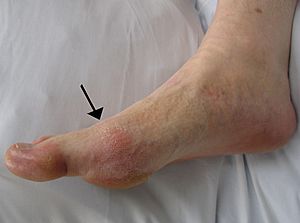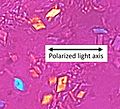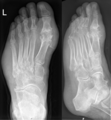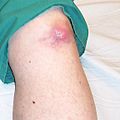Gout facts for kids
Gout is a medical condition that causes sudden, very painful attacks in your joints. It makes a joint become red, tender, hot, and swollen. These attacks happen most often in the joint at the base of the big toe.
Gout is caused by tiny crystals forming inside your body. These crystals appear when there is too much of a substance called uric acid in your blood. The crystals then build up in your joints, tendons, and other tissues, causing a lot of pain and swelling.
About half of all people with gout also experience a type of joint inflammation called arthritis. Sometimes, gout can also affect the kidneys because of these uric acid crystals. People who have had gout once often have more attacks later.
Doctors can tell if someone has gout by looking for these crystals in the fluid from a painful joint. Medicines like anti-inflammatory drugs, steroids, or colchicine can help make the symptoms better. After an attack goes away, people can make changes to their daily habits to help lower their uric acid levels.
Contents
What Causes Gout?
Gout happens when your body has too much uric acid. Uric acid is a natural waste product that forms when your body breaks down certain chemicals found in food and drinks. Normally, your kidneys remove uric acid from your blood, and it leaves your body when you pee.
But sometimes, your body either makes too much uric acid or your kidneys don't remove enough of it. When uric acid levels get too high, it can form sharp, needle-like crystals. These crystals often settle in your joints, causing the painful attacks of gout.
Symptoms of Gout
A gout attack usually comes on very quickly, often at night. The main symptom is intense pain in a joint, usually the big toe. The affected joint will also look red, feel hot, and be very swollen and tender to touch. Even the weight of a bedsheet can feel unbearable.
While the big toe is the most common spot, gout can also affect other joints. These include the ankle, knee, elbow, wrist, and fingers. An attack can last for a few days to a couple of weeks. After the attack, the joint might feel a bit sore or stiff for a while.
How Doctors Diagnose Gout
If you have symptoms of gout, a doctor will usually do a few things to find out what's going on. The most common way to diagnose gout is by taking a small sample of fluid from the affected joint. They then look at this fluid under a microscope. If they see uric acid crystals, it confirms that it's gout.
Doctors might also do blood tests to check the level of uric acid in your blood. However, high uric acid levels don't always mean you have gout, and some people with gout might not have very high levels during an attack.
Treating Gout Attacks
When a gout attack happens, the main goal is to relieve the pain and swelling. Doctors often prescribe medicines like:
- Anti-inflammatory drugs: These help reduce pain and inflammation.
- Steroids: These are strong medicines that can quickly reduce swelling and pain.
- Colchicine: This medicine is specifically used for gout and helps calm the inflammation caused by the crystals.
It's important to start treatment as soon as you feel an attack coming on.
Preventing Future Gout Attacks
After a gout attack, your doctor might suggest ways to prevent future ones. This often involves making some changes to your lifestyle and sometimes taking long-term medication.
Lifestyle changes can include:
- Eating a healthy diet: Limiting foods and drinks that are high in substances that turn into uric acid.
- Drinking plenty of water: Staying hydrated helps your kidneys flush out uric acid.
- Maintaining a healthy weight: Being overweight can increase your risk of gout.
- Limiting alcohol: Especially beer and spirits, which can raise uric acid levels.
For some people, doctors might prescribe daily medicine to lower uric acid levels in the blood. This helps stop new crystals from forming and can even dissolve existing ones over time.
Images for kids
-
Black-and-white photograph of the arms and hands of a 50-year-old man, showing large tophi of sodium urate affecting the elbow, knuckles, and finger joints.
-
Antonie van Leeuwenhoek described the microscopic appearance of uric acid crystals in 1679.
-
Uric acid crystals in polarized light, showing negative birefringence, with yellow color when aligned parallel to the axis of the red compensator, and blue when aligned perpendicularly to it.
-
Gout on X-rays of a left foot in the metatarsal-phalangeal joint of the big toe. Note also the soft tissue swelling at the lateral border of the foot.
See also
 In Spanish: Gota (enfermedad) para niños
In Spanish: Gota (enfermedad) para niños
 | William M. Jackson |
 | Juan E. Gilbert |
 | Neil deGrasse Tyson |












